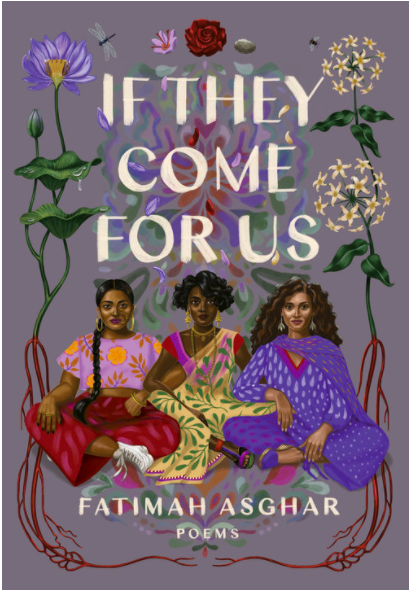Sunday is often a day for self-care. On days like this Powell’s City of Books in Portland, Oregon finds itself occupied with those who seek the subtle sounds of the pages of a book, the crack of the binding, the smell of the freshly printed pages and the reflections, philosophies, and tales on those pages. For many, books are a way to decompress, a path to higher learning, and often a conduit for self awareness and identity; which is why Fatimah Asghar’s reading of her brand new book, If They Come For Us, is so incredibly significant.
Fatimah sat cross legged on a bench near the water fountain waiting for people to slowly file in. By the time 2pm hit the rows of fold out chairs were nearly full, friends who happened to show up at the same reading had said their cheery hellos, and the audience sat in anticipatory silence for Fatimah to read from her book and join in conversation with fellow Muslim poet, Samiya Bashir, author of Field Theories. “It’s so nice to read with another Muslim poet.” Fatimah expressed to Samiya at one point.
That simple statement seemed to illustrate the lack of representation and literature by and for the muslim community. Fatimah Asghar is a Pakistani, Kashmiri, Muslim American writer, poet, screenwriter and performer. If They Come For Us is only the latest in the long list of her many accomplishments. One that grapples with the loss of both her parents at a young age, confronts body image and impossible beauty standards, explores gender identity, sexuality, colonization and violence in a coming of age story at a time when islamophobia is at a repulsive high.
Poems like, “Other Body” and “Haram” tackle body image in incredibly raw ways. “Haram” pulls the reader into the new and uncomfortable experience of two young girls going through puberty and the confusion and shame that followed. “Other Body” boldy grapples with gender identity, sexuality and body image as well. Fortunately, with age came positive self-awareness for Fatimah. “I wish I had spent less time hating myself.” Fatimah revealed candidly. “Women of color in particular, we’re just never seen as beautiful or never the standard of what beauty is.”
Like many women of color, she is naturally hairier which she hated growing up because she was teased about it. Now she gets stopped and people tell her how beautiful her thick eyebrows are. “So much of that stuff comes and goes and I think it’s really important to just find a way to think about who you are and what you love about yourself and to hold onto that even when other people tell you that’s not good.”
A common theme throughout the entire book is the importance and impact of our history and the ripple effects that we all still experience from it today. The forward of If The Come For Us briefly explains the forced migration and ethnic cleansing of the India/Pakistan Partition in South Asia in which millions died, and many more were abducted and raped. This resulted in their independence from colonial Britain— a history that has been largely glossed over even though it was only a generation ago. “I think that there is a real violence that comes from when you erase peoples histories.” Fatimah explained. “I see it in America a lot were white people are like, ‘Well that thing happened so long ago,’ and it’s like, ‘No, it didn’t happen that long ago.’ That was my parents’ generation. Then to think about colonization or slavery or indigenous genocide, those are so recent. They affect everything and they’ve never gone away. It’s the same thing with Partition where South Asia’s refusal to acknowledge the violences of Partition and the retributive genocide, really made the hotbed for that same kind of ethnic based violence. It happens a lot in India and Pakistan. In India, there’s a lot of times we’re Muslim people are at harm.”
The common thread between America’s history of brutality and erasure of people of color from the history books with the erasure of the history of Partition are too similar not to correlate— especially for a woman whose identity sits firmly within both. It allows her to seamlessly teeter between the two, piercing the fallacy of “America, land of the free.” Fatimah went on to illuminate, “These nations have constructed these historical fallacies that justify why they exist, which is what America does too. America is the ‘land of the free’ and yet was founded on slavery and indigenous genocide. That doesn’t compute. It’s only the land of the free for a few. It’s a fallacy that the nation has created to talk about itself, which is the same in Pakistan and in India.”
Fatimah’s work, whether it be If They Come For Us, or with the Emmy nominated web series Brown Girls, radiates because of its painfully honest narratives that shed light on the stories and people within the communities of those often ignored — their beauty, their battles, and institutions that attempt to suppress and control them. “I think that it’s really important for artists to always kind of disrupt what’s happening.” Fatimah disclosed. “I know that’s a huge driver in my work. I think of it as a disruption, an active pledge of ‘I don’t fuck with this, I’m not here for this.’ And I make art with a particular political bent because that’s important to me.”
Follow Fatimah:
https://twitter.com/asgharthegrouch
https://www.instagram.com/asgharthegrouch/
https://www.fatimahasghar.com/



